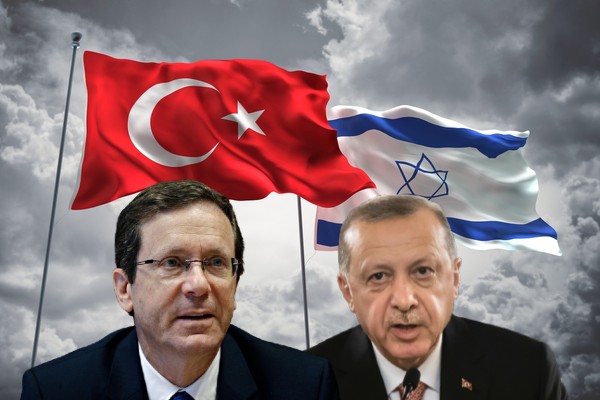What’s on the agenda for Herzog-Erdogan talks?
By Pesach Benson, United With Israel
Israeli President Isaac Herzog landed in Turkey on Wednesday for a 24-hour visit that hopes to warm up strained relations.
The bulk of Herzog’s time will be spent in discussions with Turkish President Tayyip Erdogan in Ankara. Also on the agenda is a meeting with members of Turkey’s Jewish community in Istanbul.
Jerusalem and Ankara have had difficult relations for more than a decade. Israeli-Turkish relations soured in 2010 during the Mavi Marmara affair and snapped in 2018 when Turkey expelled Israel’s ambassador over Gaza border riots.
“The relationship with Turkey has had its ups and downs in recent years — we will not agree on everything, but we will try to restart relations,” the President said in a statement before his departure.
Herzog’s trip marks the first high-level Israeli visit since the visits of president Shimon Peres and prime minister Ehud Olmert in 2007 and 2008 respectively.
Times have changed and the two countries have good reasons for a rapprochement.
What are the key issues likely to be on Herzog and Erdogan’s agenda?
1. The Russia-Ukraine War.
Both Israel and Turkey oppose the Russian invasion but are tempering their criticisms for fear of antagonizing Moscow and jeopardizing strategic interests.
If Erdogan had any hopes of raising his profile by mediating the Russia-Ukrainian conflict, he will now have to play sidekick to Naftali Bennett, who already traveled to Moscow — with the blessings of Ukraine, the U.S. and Europe.
Could coordinating a response to the war be helpful?
2. Offshore Gas
Europe intends to wean itself off of Russian gas, but has to find a new supplier. Gas from the Eastern Mediterranean is the most obvious answer. Israel was trying to advance the ambitious EastMed pipeline with Cyprus and Greece, both rivals of Turkey.
But EastMed was undercut when the Biden administration dropped U.S support for the initiative in January, calling it politically “destabilizing” and questioning its economic and environmental viability.
Erdogan has made clear he wants to partner with Israel on bringing gas to Europe. Israel has insisted it will not cut a deal with Turkey at the expense of Cyprus and Greece.
Can a creative solution be found?
3. Bilateral Trade
Overshadowed by news of Bennett’s diplomacy was the arrival of a delegation of more than 100 senior businessmen in Tel Aviv to meet their Israeli counterparts. The highlight, Globes reported, was the signing of a memorandum of understanding between the Turkish Exporters Assembly and Israel’s Federation of International Chambers of Commerce.
Globes added that trade between the two countries rose 35 percent in 2021 — from $4.9 billion in 2020 to to $6.7 billion in 2021.
Erdogan is grappling with inflation running at 54% while sanctions on Russia has taken away one of Turkey’s key trading partners.
What opportunities does this mean for Israeli business?
4. Hosting Hamas
Turkey’s backing of Hamas stems from its overall support for the Muslim Brotherhood and the Islamist ideology of Turkey’s ruling Justice and Development Party (AKP). Hamas is the Palestinian affiliate of the Muslim Brotherhood.
That’s why Turkey not only hosts Hamas, it has even provided Hamas officials with Turkish passports.
In February, Turkish media reported that Erdogan was moving to expel members of Hamas’ “military wing” and looking into finding other countries to host them. Turkish officials neither confirmed nor denied the reports.
Israel began ramping up pressure on Erdogan to shut down Hamas in November following a series of IDF raids on a Hamas terror cell in Judea and Samaria. However, Jerusalem has also said that expelling Hamas is not a condition for rapprochement.
Is there more going on than what’s reported in the news?
5. Turkish Meddling in Jerusalem
Erdogan has been trying to expand Turkish influence in eastern Jerusalem by supporting Islamist charities. This has caused friction not just with Israel, but with Jordan which distrusts Erdogan.
Erdogan has also been making contributions to the Islamic Waqf, which oversees the day-to-day administration of the Temple Mount. Jordan, whose oversight of the Waqf is enshrined in the Israel-Jordan peace agreements, distrusts what it sees as Erdogan’s meddling in the Temple Mount.
The Palestinian Authority has been expanding its influence over the Waqf too, but Israel and Jordan may regard Erdogan’s in-roads as a bigger threat.
Next time Palestinians escalate tensions over the Temple Mount, could Turkey be a calming influence, or will Erdogan revert to old habits and fan the flames?
